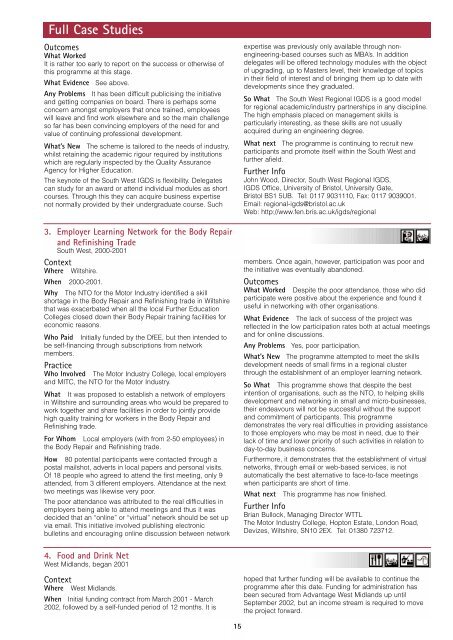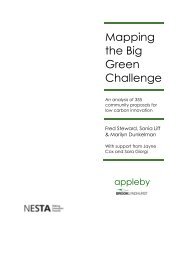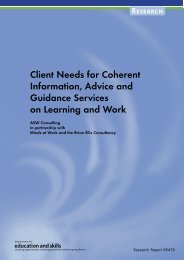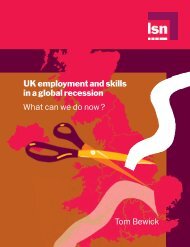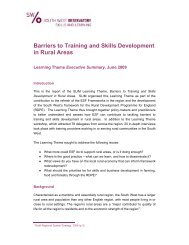Full Case StudiesOutcomesWhat WorkedIt is rather too early to report on the success or otherwise ofthis programme at this stage.What Evidence See above.Any Problems It has been difficult publicising the initiativeand getting companies on board. <strong>The</strong>re is perhaps someconcern amongst employers that once trained, employeeswill leave and find work elsewhere and so the main challengeso far has been convincing employers of the need for andvalue of continuing professional development.What’s New <strong>The</strong> scheme is tailored to the needs of industry,whilst retaining the academic rigour required by institutionswhich are regularly inspected by the Quality AssuranceAgency for Higher Education.<strong>The</strong> keynote of the South West IGDS is flexibility. Delegatescan study for an award or attend individual modules as shortcourses. Through this they can acquire business expertisenot normally provided by their undergraduate course. Such3. Employer <strong>Learning</strong> Network for the Body Repairand Refinishing TradeSouth West, 2000-2001ContextWhere Wiltshire.When 2000-2001.Why <strong>The</strong> NTO for the Motor Industry identified a skillshortage in the Body Repair and Refinishing trade in Wiltshirethat was exacerbated when all the local Further EducationColleges closed down their Body Repair training facilities foreconomic reasons.Who Paid Initially funded by the DfEE, but then intended tobe self-financing through subscriptions from networkmembers.PracticeWho Involved <strong>The</strong> Motor Industry College, local employersand MITC, the NTO for the Motor Industry.What It was proposed to establish a network of employersin Wiltshire and surrounding areas who would be prepared towork together and share facilities in order to jointly providehigh quality training for workers in the Body Repair andRefinishing trade.For Whom Local employers (with from 2-50 employees) inthe Body Repair and Refinishing trade.How 80 potential participants were contacted through apostal mailshot, adverts in local papers and personal visits.Of 18 people who agreed to attend the first meeting, only 9attended, from 3 different employers. Attendance at the nexttwo meetings was likewise very poor.<strong>The</strong> poor attendance was attributed to the real difficulties inemployers being able to attend meetings and thus it wasdecided that an “online” or “virtual” network should be set upvia email. This initiative involved publishing electronicbulletins and encouraging online discussion between network4. Food and Drink NetWest Midlands, began 2001ContextWhere West Midlands.When Initial funding contract from March 2001 - March2002, followed by a self-funded period of 12 months. It isexpertise was previously only available through nonengineering-basedcourses such as MBA’s. In additiondelegates will be offered technology modules with the objectof upgrading, up to Masters level, their knowledge of topicsin their field of interest and of bringing them up to date withdevelopments since they graduated.So What <strong>The</strong> South West Regional IGDS is a good modelfor regional academic/industry partnerships in any discipline.<strong>The</strong> high emphasis placed on management skills isparticularly interesting, as these skills are not usuallyacquired during an engineering degree.What next <strong>The</strong> programme is continuing to recruit newparticipants and promote itself within the South West andfurther afield.Further InfoJohn Wood, Director, South West Regional IGDS,IGDS Office, University of Bristol, University Gate,Bristol BS1 5UB. Tel: 0117 9031110, Fax: 0117 9039001.Email: regional-igds@bristol.ac.ukWeb: http://www.fen.bris.ac.uk/igds/regionalmembers. Once again, however, participation was poor andthe initiative was eventually abandoned.OutcomesWhat Worked Despite the poor attendance, those who didparticipate were positive about the experience and found ituseful in networking with other organisations.What Evidence <strong>The</strong> lack of success of the project wasreflected in the low participation rates both at actual meetingsand for online discussions.Any Problems Yes, poor participation.What’s New <strong>The</strong> programme attempted to meet the skillsdevelopment needs of small firms in a regional clusterthrough the establishment of an employer learning network.So What This programme shows that despite the bestintention of organisations, such as the NTO, to helping skillsdevelopment and networking in small and micro-businesses,their endeavours will not be successful without the supportand commitment of participants. This programmedemonstrates the very real difficulties in providing assistanceto those employers who may be most in need, due to theirlack of time and lower priority of such activities in relation today-to-day business concerns.Furthermore, it demonstrates that the establishment of virtualnetworks, through email or web-based services, is notautomatically the best alternative to face-to-face meetingswhen participants are short of time.What next This programme has now finished.Further InfoBrian Bullock, Managing Director WTTL<strong>The</strong> Motor Industry College, Hopton Estate, London Road,Devizes, Wiltshire, SN10 2EX. Tel: 01380 723712.hoped that further funding will be available to continue theprogramme after this date. Funding for administration hasbeen secured from Advantage West Midlands up untilSeptember 2002, but an income stream is required to movethe project forward.15
Full Case StudiesWhy Food and Drink Net has the clear aim of deliveringregional excellence and specifically industry-focused learningwhich will be the driver of future growth and achievement. Itis proposed that the encouragement of better trained andskilled personnel within the food & drink manufacturing andprocessing industry will help individual companies tomaximise performance and profitability and place the WestMidlands at the cutting edge of a vital and global industry.Who Paid Advantage West Midlands (RDA) through the<strong>Skills</strong> Development Fund.PracticeWho Involved <strong>The</strong> initiative involves a large number oforganisations including local employers, colleges, Chambersof Commerce, City and County Councils, national trainingorganisations and Coventry University.What <strong>The</strong> Food and Drink Net initiative involvesencouraging participation in learning and skills developmentin a sector that has traditionally had a poor record of trainingand employee development. This is done by providingindustry-focussed training for manufacturers and processorsin the food and drink sector.Activities are promoted through advisors, a website portal,events/workshops and other promotional activities. Relatedactivities have included offering a subsidised 50/50 deal oncomputers for training use and also establishing a mentoringservice to assist manufacturing and processing companies inthe region to plan and evaluate their training provision over asix month period. <strong>The</strong> current offer is for 2 free visits percompany. <strong>The</strong> project also contacts the sector via directmailing of information leaflets a newsletter and telephonemarketing.For Whom Food, drink and related manufacturers andprocessors of all sizes in the West Midlands.How <strong>The</strong> main focus of the initiative has been a web siteoffering details of training courses and training providers inthe region. By working closely with training providers as wellas users, efforts have been made to match training provisionto demand. Use of the website service is free and thementoring service is free of charge for the first two meetings.OutcomesWhat Worked <strong>The</strong> initiative has been well received andFood and Drink Net are now working directly with 102companies in the region. <strong>The</strong> website, itself received 20,000hits in January 2002.What Evidence <strong>Part</strong>icipation levels.Any Problems <strong>The</strong>re have been difficulties in the timeneeded to set up such a network in relation to the short, andlimited duration of funding streams. If further funding is notsecured, there is a risk that the initiative will terminate as it isnot yet in a stage where it could become self-sustainable. Ina similar vein, the project co-ordinator has found it hard tofind out about other projects and initiatives with which theycould partner and thus, potentially tap into other fundingopportunities.A further disappointment was the low up take of 50/50computer deal. Companies were sceptical of the offer and asa result not all available deals were used.What’s New Promoting training message to employers in asector with a high-staff turnover and poor attitude towardstraining. Establishing a web-based portal to training andlearning opportunities. Translating the needs and aspirationsof a relatively new sector (food manufacturing) to trainingproviders.So What A large part of the programme has been inpersuading employers of the value of employee developmentin a sector with high staff turnover and relatively negativeattitudes towards learning and training.It has been argued that the duration of funding throughstreams such as the SDF may be too short to permit theestablishment of sustainable initiatives and that perhapsconsideration should be paid as to how they could besupported for a longer period once there is evidence of theireffectiveness. This might involve providing improved accessto information on potential partner initiatives and how differentprojects could be encouraged to work together.What next Looking for more funding.Further InfoRuth Dolby, Project Manager Food and Drink net,Centre for Lifelong <strong>Learning</strong>, Coventry University,Priory Street, Coventry, CV1 5FB.Tel: 024 76887113, Fax: 024 7688 8138Email: fnd@coventry.ac.ukWeb: www.foodanddrinknet.org.5. Bakery Training Council – Employers <strong>Learning</strong> NetworkNation-wide, 2000-2001ContextWhere Networks were set up throughout England, Walesand Scotland.When Initial phase from October 2000 to April 2001.Why To support training and development in the bakerysector by establishing a series of employer networks toencourage small employers to share resources, expertise andknowledge.Who Paid NTO-NC and the Bakery Training Council (NTOfor the Bakery sector).PracticeWho InvolvedBakery Training Council, Anglo-Welsh BakeryTraining, National Association of Master Bakers, ScottishBakery Training Council (SBTC), Scottish Association ofMaster Bakers (SAMB) and local employers.What Employer <strong>Learning</strong> Networks (ELNs) were set upthroughout the UK to support the sharing of trainingresources and knowledge between small employers in thebakery sector.16An ELN was established for each of the 6 Scottish regionsand 8 English regions.For Whom Employers in the Baking industry.How Through a series of regional meetings, the BakeryTraining Council and partners invited local employers toparticipate in ELNs to identify training needs of the professionand ways in which skills and training provision could beimproved. This work was supported in England by atelephone survey of BTC members and identified some of thefollowing difficulties:• Recruitment: baking companies are finding it nearimpossible to recruit trained and/or experienced bakersregardless of their location.• Retention: people agreed that staff retention was an issueand is largely affected by management style.• Training needs: there is a recognition of the need forbasic management training, IT, specific sector skills (suchas cake decorating), good work placements for traineeand semi-skilled staff, improved NVQs and the opportunityfor training needs analysis.


